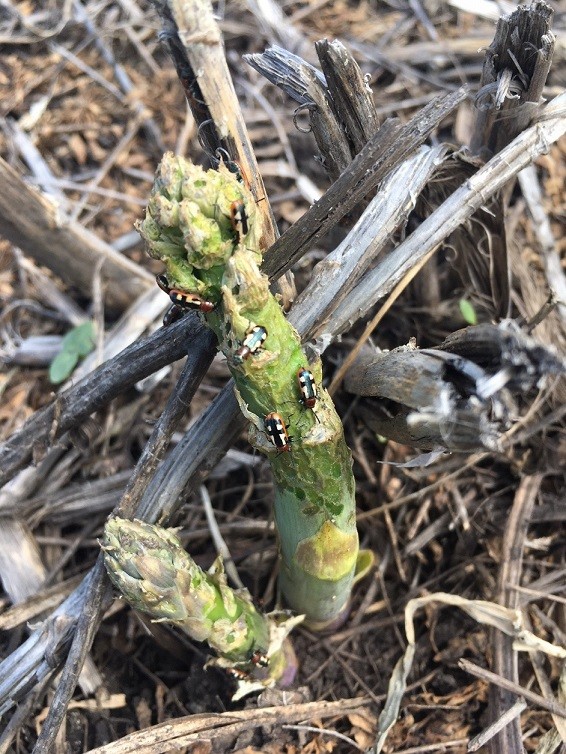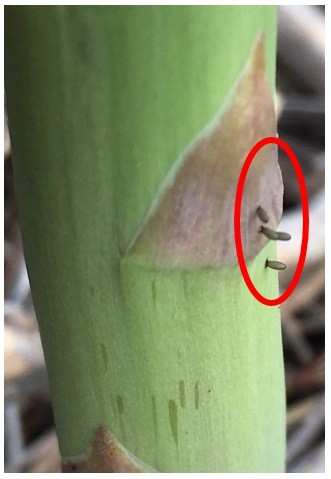Common Asparagus Beetle Management During Harvest Season
Ethan Grundberg, Vegetable Specialist
Eastern New York Commercial Horticulture
The beginning stages of Common asparagus beetle (Crioceris asparagiI) infestations often go unnoticed. Since the beetles have two to three generations per year (depending upon where you are in our region), the population can build quickly over the course of a couple of years and catch growers off-guard at harvest.
Overwintered adults emerge from their pupae about the same time that asparagus spears begin to push. They quickly begin to feed on the tender shoots causing a sort of rasping damage that browns quickly in the field or post-harvest. The beetles then mate and deposit their eggs in vertical lines along the spears as shown in the image. After about a week, those eggs hatch into small grubs that continue to feed on spears before pupating in the soil.
Though the larvae, not adults, are most susceptible to insecticides, growers experiencing significant early damage (the economic threshold is suggested to be when 5%-10% of spears have adults present) may need to use an insecticide to knock down the adults before targeting larvae and later generations on ferns. Given the need to continue harvesting every 1-2 days (a practice that also helps remove eggs from the field to slow the population growth), a short Pre-Harvest Interval (PHI) and Restricted Entry Interval (REI) are key to selecting an appropriate labeled insecticide.
The standard insecticide options are pyrethroids (IRAC Group 3A), such as Pounce 25 WP and other labeled permethrin formulations (1 day PHI, 12 hour REI) or PyGanic 5.0 (OMRI, 0 day PHI, 12 hour REI). Some neonicitnoids (IRAC Group 4A), such as Assail 70 WP and Anarchy 30 SG (both acetamiprid), are also labeled for asparagus beetle adults and larvae during harvest (1 day PHI, 12 hour REI). Lannate (methomyl, IRAC Group 1A), is also options if you are willing to equip the harvest crew with early entry PPE (1 day PHI, 48 hour REI) to continue removing egg masses on cut spears. An easier option for those looking to use an organophosphate is Sevin XLR Plus (carbaryl, 1 day PHI, 12 hour REI). Note that Lorsban (chlorpyrifos) is sometimes recommended in other states, but IS NOT allowed for use on asparagus in New York.
For heavily infested fields, continue scouting the asparagus after harvest and target second and/or third generations with any of the options listed above or with IRAC Group 5 spinosyns, such as Radiant or Entrust (OMRI), both of which have a 60 day PHI. Cleaning fields of old stalks after mowing in the fall can also help reduce the overwintering populations.
 1. Common asparagus beetle adults feeding on an emerging spear
1. Common asparagus beetle adults feeding on an emerging spear 2. Grayish colored asparagus beetle eggs visible in a vertical line on a young spear
2. Grayish colored asparagus beetle eggs visible in a vertical line on a young spear
Upcoming Events
ENY Orchard Soil Health and Beneficial Fungi Meeting
August 15, 2024 : ENY Orchard Soil Health and Beneficial Fungi Meeting
Peru, NY
Join the members of CCE ENYCHP and the Cornell Soil Health Program for a field meeting on the basics of soil health, the potential benefits of mycorrhizal fungi, and an update on the current project status of our SARE grant on orchard mycorrhizal products.
This meeting is intended for farmworkers, young and beginning orchardists, and experienced orchard managers wanting to learn about the basics of soil health and mycorrhizal fungi within the orchard.
North Point Community Farm Twilight Meeting
August 19, 2024 : North Point Community Farm Twilight Meeting
Plattsburgh, NY
North Point Community Farm Twilight Meeting
Monday, August 19th 4-7 pm (rain or shine)
2172 Military Turnpike, Plattsburgh, NY 12901
$10 per farm
Join us for a tour of North Point Community Farm, a diversified vegetable, berry, and flower operation in the North Country. Farmers Marisa and Mike will give us an overview of their decision-making as they expand their business, increasing their high tunnel production, investing in new tillage equipment, and transforming an old dairy barn into an efficient wash-pack shed with food safety in mind. We'll end the evening with local food refreshments and an opportunity to network with growers from NY and VT.
DEC credits: 1.5 credits in categories 1A, 10, 23
Late Summer Orchard Meeting
August 21, 2024
Fonda, NY
Join us for our last get together of the summer before we're in the thick of harvest. At this meeting, we will tour Sand Flats Orchard with manager Mitch Hoffman, and we will then discuss late season pest management tasks with our experts from the HVRL and Cornell AgriTech.
DEC Credits: 1.5 credits in categories 1A, 10, and 22.












































